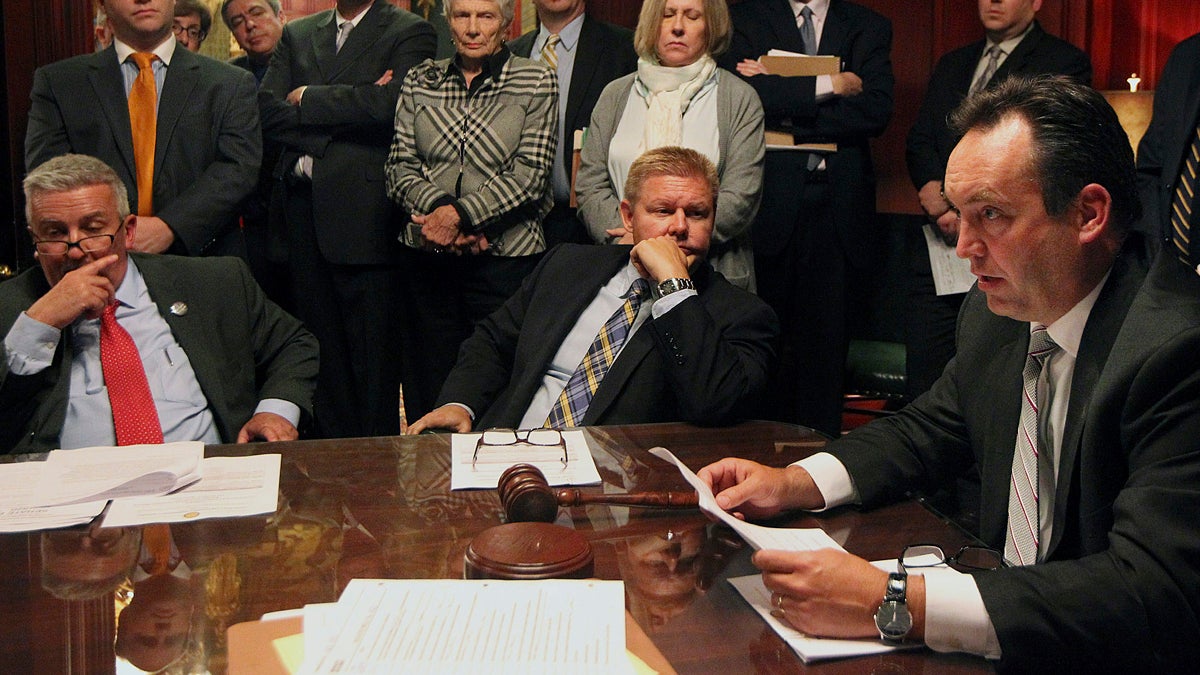Pa. Senate leaders say House-backed pension bill comes up short

Sen. Majority Leader Jake Corman
Gov. Wolf ready to sign a reform bill
A bill that would offer new teachers and most state employees less generous retirement benefits passed the state House of Representatives with bipartisan support this week.
Governor Tom Wolf says he would sign the measure.
Leaders in the Senate, though, do not plan to move forward.
Currently, teachers and state workers receive guaranteed pension benefits no matter how well funds perform in the stock market.
The bill as passed by the House would give new workers a guaranteed state pension based on the first $50,000 of salary, with a yearly 3 percent index for inflation.
On salary beyond that – and all salary after 25 years – workers would get a 401k-style retirement benefit where the ultimate payout is based on market performance.
The changes would occur in 2018.
The House estimates its plan will save $5 billion over 32 years – about 2 percent of the total tab.
Teachers unions have been vocal in their dislike of the bill. They say undercutting retirees’ long term fiscal security will make the profession less attractive.
Senate majority leader Jake Corman, R-Centre, also opposes it, but for different reasons. He says it doesn’t go far enough to protect taxpayers.
“Well, we’re not going to concur on it that’s for sure. We’re not going to send it to the governor,” he said. “At this point we’re hoping for a dialogue to see what we can do.”
Corman wants to completely end state pension plans for new employees. In December, his caucus compromised, and the Senate passed a plan giving workers a hybrid pension/401k plan no matter their salary level.
Guaranteed retirement benefits would be smaller under the Senate-backed plan, with less risk placed on the Commonwealth.
Governor Wolf was on board with that deal in the context of larger budget negotiations that would have delivered a bigger boost to education.
That grand bargain eventually faltered, largely because of lack of support in the House for the entire menu of compromises.
The governor’s spokesman said Wolf is now ready to concur – outside of larger budget negotiations – on either the House’s pension plan, or the Senate’s version.
Despite holding majorities in the General Assembly for years, state Republicans have long failed to reach agreement on revising pension laws.
Pension obligations have ballooned in recent years – largely the product of legislative actions in the 2000s when lawmakers sweetened benefits, counted on too sunny market projections, and underfunded the accounts.
The rising costs have been eating up larger and larger portions of school district budgets, which have forced program cuts and tax hikes.
Pension plans for teachers and state workers have a more than $50 billion underfunded liability.
Neither of the plans on the table would ease these distresses in the near-term.
WHYY is your source for fact-based, in-depth journalism and information. As a nonprofit organization, we rely on financial support from readers like you. Please give today.



